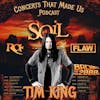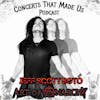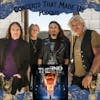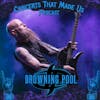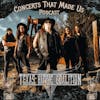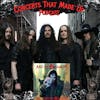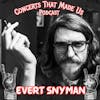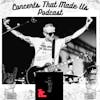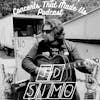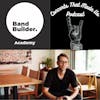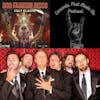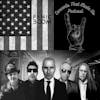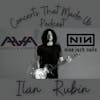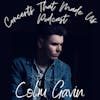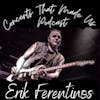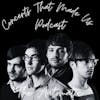Ilan Rubin - Nine Inch Nails - Angels and Airwaves

This week for the season finale Brian is joined by the most in demand musician in rock music Ilan Rubin. The youngest person ever inducted into The Rock and Roll Hall of Fame and drummer for Nine Inch Nails and Angels and Airwaves. They discuss Ilan's latest solo release, why he decided to drop the moniker "The New Regime" and start performing as Ilan Rubin. Learn about his influences and early gigs and Ilan shares a never before heard story with Brian about an incident that could have cost him his place in Nine Inch Nails. Up until now Ilan has never felt comfortable sharing this story with anybody outside his inner circle. Later in the episode they discuss what it was like to experience the ultimate concert, seeing rock gods Led Zeppelin live in concert. Find out who Ilan would spend 24 hours locked in a room with - weird question Ilan I know :) who he would love to see in concert and what song would appear on the soundtrack to his life. All this and much more on this weeks Concerts That Made Us. Find out more about Ilan Rubin here: https://ilanrubinmusic.com/ https://www.instagram.com/ilanrubin https://twitter.com/ilanrubin https://www.thenewregime.com https://www.qdrumco.com https://www.angelsandairwaves.com https://www.nin.com Ilan Live with Nine Inch Nails https://www.youtube.com/watch?v=zmT8bB11KoA Led Zeppelin 2007 Celebration Day Concert https://www.youtube.com/watch?v=PD-MdiUm1_Y Find Us at: www.concertsthatmadeus.com --- Send in a voice message: https://anchor.fm/ctmu/message
Brian O Connor 0:01
Ilan Rubin, you're very welcome to Concerts That Made Us. Thank you. Thank you for having me. It's a real pinch me moment now to get you on the podcast. So I'm very excited. Wow. Likewise, thanks for having me. So at today's you've had an absolutely amazing career that I'm sure some rock stars twice your age would probably kill for. Before we get into it. Do you want to tell the listeners a bit about your solo project? I know your song talk talk talk is going to be planned so to see. Yeah, well,
Ilan Rubin 0:33
it's my first solo single, if you will, I released music for quite a while under a monitor. And I decided during the pandemic to have a semblance of a fresh start and start releasing music under my name and not having anything to hide behind and talk talk talk is the first single released as Alon Ruben. So I play I wrote, played and sang everything on the recording, as is my usual ml. But yeah, it's a it's a song I'm very proud of. And it's just a taste of what's to come. It's always difficult figuring out what the first impression should be. But I did want to make it known that it would be different to what I've released in the past. So that's that.
Brian O Connor 1:22
Yeah, yeah. What made you decide to kind of take the leap to use your own name and make it a bit different from the past?
Ilan Rubin 1:29
It was it was a combination of things. But really, one thing that just continued to baffle me as time progressed was that although I wrote played and sang everything, and made no secret that the new regime, which is the moniker I wrote under was me, people still had a tough time connecting the dots there. And I'm like, well, this is, this is definitely a disservice I didn't foresee. And there was, there was a while where I was like, well, it's already it's too late now to kind of change. But, you know, it's never too late. And it was a sort of eye opening moment, just with the world kind of getting flipped on its head where I was just like, you know, what, I don't want to come out of this with a year of, quote, unquote, wasted time. And the reason why I say, quote, unquote, is because I really made the most of the pandemic lockdown, personally, and in terms of productivity, but I was like, I don't want to come out of this and pick up where I left off. I want to come out of this and start something new. Yeah, yeah. And that those two things were the deciding factor. But going back to what I was starting my response with, I mean, I would literally open up a show as the new regime for angels and airwaves, which is one of the bands I played drums for, I would then go and play drums on the very same stage 15 minutes later. And after that, I would get a variety of comments from people who would seem to be like, you look like the singer in the new regime, or you look like a drummer and angels and airwaves. I'm like, Okay, this this is this has to change. Yeah. And so once again, pandemic kind of opened my eyes and I thought, yeah, it's, I'm doing myself a disservice. And I'm proud of what I do. So there's nothing to hide behind.
Brian O Connor 3:23
Exactly, exactly. You kind of remind me of, you've surely come across that where a lot of people online said f the drummer from Nirvana looks an awful lot like the lead singer to Foo Fighters. Yeah, there
Ilan Rubin 3:34
you go. Of course, he has achieved monumental success, which is phenomenal and something to strive for.
Brian O Connor 3:48
Yeah, exactly. Exactly. We will move on to your your career, so to speak, share why, what would be your earliest musical memory?
Ilan Rubin 4:00
My earliest musical memory as a musician, or just music in general, music in general. Um, what comes to mind is dabbling with Magical Mystery Tour.
Brian O Connor 4:20
Right?
Ilan Rubin 4:21
I don't, I don't I mean, I was about to say, I don't know why my dad is practically a Beatles fanatic, which is why it's in my blood. But and the Beatles are obviously one of my favorites today. But I did recall having a moment with his CD of it, you know, because this was in the 90s. I was born in 88. Of course, he I mean, he was the type of Beatles fan where he had all the capital releases, because that's what came out in America. But then he ordered all the Parlophone releases from a record shop. So he had both Yeah, and yeah, when everything was kind of transferred to CD, he got to see And that's that was my introduction. And I don't really recall how or why, but I just remember looking at that CD quite a bit, and I'm the walrus stuck out to me in particular. And it's a weird thing because my Beatles obsession did not start there.
Brian O Connor 5:19
Right. But
Ilan Rubin 5:20
it was just in the house. Fast forward a couple of years later, at least. And the very first thing that my dad taught me was the Phil that comes into the walrus when when Ringo makes his introduction to the song, and then fast forward a few years later after that, because it still hadn't hit me, I then became pretty much a Beatles fanatic in my early mid teens.
Brian O Connor 5:46
It tends to happen around then, doesn't it? It's like you were, you're always aware of the Beatles, but when you hit your teen years, they really sink in, and you realize how important they were?
Ilan Rubin 5:58
Yeah, yeah, absolutely. And, you know, pardon me if if you already know this, because it's hard for me to get through a musical conversation and not reference either the Beatles or Led Zeppelin, but with Led Zeppelin, that was a knock me over the head moment. And the reason why that influence has been so multi dimensional with me is because initially, my dad turned me on to Led Zeppelin as a drummer. And saw on one album, one, the drums are amazing, and they're fascinating, and that pulls you in, then you have the simpler sort of surface level of just enjoying great riffs and a great singer, then you dive into actually understanding what the songs are doing, then you get into a deeper level of kind of like subdividing all the different elements that make the hole as great as it is. So I was hit. I've literally been obsessed with them since I was eight years old. You know? Yeah. And I give all my credit to Ringo but there wasn't that primal attraction to the drumming of Ringo. Ringo is like an acquired appreciation. It's kind of like it's there. It does a great job but if you really want to appreciate it, you kind of need to peel back some layers it's not as apparent as or as obvious I should say is you know bottom on good times bad time. So I digress. But let's continue.
Brian O Connor 7:28
Okay, okay. At the very first single or album you ever purchased
Ilan Rubin 7:34
Oh, God, I actually don't recall but what I will say is that growing up there would be an album was once I was fully into music as a as a mature nine year old or whatever it was. CDs kind of became a gift at you know, holidays or whatever. So I do recall getting wheels the fire. You know, no surprise. I had a 16 minute drum solo on it. And my dad like Craven said you should listen to cream. So still have cream to this day? Yeah, I do recall the the 90s Led Zeppelin box set that was like a holy grail moment. To me. I'm like, Oh my god, I am literally holding everything they've ever done in one box. That was like mind boggling to me. And like I say, I'm already sounding redundant. But I remember being stuck at home. Sick one day, just feeling terrible. And my dad was like, You know what, I'm gonna step out of the house for just a second. And he came back with what was brand new then, which was the Led Zeppelin BBC sessions. And so all these things are obviously within the same world. But these were like the new things to me that I was getting. But they were gifts more so than me kind of saving up some cash and go into warehouse or Sam Goody or whatever. The hell was around at the time.
Brian O Connor 9:03
Yeah, yeah. Yeah, you definitely had a very good introduction to great music. I almost like you. You were set up, that you couldn't fail when it comes to your music tastes are being.
Ilan Rubin 9:18
Yeah, I'm very fortunate that I what I do find funny is that I've met people, either my age or older than me, who eventually ended up where I started, because I had the guidance. And I never had. This may sound disappointing to some of your listeners or viewers, but I never had like a rebellious bone in my body. So it wasn't like, I don't want to listen to my parents music. It's like, no, this is great. So I'm going to listen to it. And a lot of the people I've encountered either weren't introduced to it, and discovered it later on in life, or made a conscious effort to avoid it.
Brian O Connor 9:58
Right. It just wasn't cool enough. Yeah,
Ilan Rubin 10:00
until later years are like, you know what? This actually really good song. It's like no shit. There you go.
Brian O Connor 10:07
Oh, man. Yeah, so it says people are funny. The air, shore air before we get into the concert you've played so what? What was the first concert you ever attended?
Ilan Rubin 10:18
Oh god, I'm so bad at this. And I do apologize because I know that was no premise, the premise of this interview? It's kind of it's kind of a, I mean, it's definitely a blur, or also I would have a definitive answer for you. My parents were always somewhat of the concert goer type, and they were more so you know, in their 20s, probably, you know, teens and 20s, maybe a bit into their 30s. So I have no doubt that perhaps I was taken to something because I do have this this very vague recollection of seeing somebody perform on stage. And what appeared to me then to be a sizable venue. I mean, for all I know, is a tiny stage with 100 people watching but but at the time, you know, at the time, it seemed like, Okay, I'm at a concert, this is what a concert is. But it all sort of happened to me, as both a viewer listener, music fan, and musician, so pretty much when I started playing drums, my oldest brother, I'm the youngest of three pretty much drafted me into his, his high school band. So there's a big blur between either watching the show or playing a show. And I started very early on, you know, eight, nine years old, I was already performing. And by, say, 11 years old, a couple of the a few of the shows were fairly sizable. So it's just this kind of a blur there.
Yeah, yeah, I can understand, you know, but by 11, I was already kind of, I had played my first Warped Tour. And that's, that's an experience that stands out, because that would be the first sort of festival I'd ever been to. Yeah, it's at 11 years old. So it's, once again, it's in a hazy part of my memory. And, you know, the the, the following year after that, we played a week on the warp tour. And then two years after that, we played three weeks. So he's, you know, that it was never my my music, per se, but it was a fantastic experience. Getting to play in front of people kind of feeling that competitive spirit were because obviously, I wasn't playing on a main stage at that point. In fact, I was playing on the smallest stage most of the time. But but there was that sort of like, competitive grit that was instilled where it's like, how do we get more people to watch us instead of whoever else is around? Yeah. And, you know, one thing progressed to another, and I kept touring more and more and more, but I'm sure we'll get into that. So, again, I digress. And I had inarticulate and imprecise, first concert. Right. Okay. Okay. So the first professional gig that really made you feel like, yes, this is what I want to do with my life. And I'm actually starting to get places. What was done?
Well, that gig would not have been a professional gig by any means. Okay, because it's, it's it's many years, or Usually, it's many years before you have a professional gig. The first time I ever performed in public was that a battle of the bands in the high school gymnasium when I was eight or nine. And that was, that was a really fun moment. I didn't have you know, a semblance of nerves or stage fright or anything. And as a result of that, and the proceeding concerts where they just did a great job of making me feel comfortable performing in front of others. It was kind of embedded in me from such a young point. And I really think it's a it's an advantage when being on stage is one of your comfort zones.
Brian O Connor 14:26
Yeah, yeah. It's a very rare thing.
Ilan Rubin 14:29
Yeah. And I can't imagine how difficult it would be for somebody who say, hasn't been on stage until they're, I don't know 15 1617, which is usually when you kind of have that first moment. And I think people either gravitate towards it or they don't. But not even really having a precise start time and just kind of looking back and be like I've already been doing this for a few years. You know, because I don't recall what I felt like at the time. I just recall enjoying it. Yes. So that must have been a very formative experience for me. Like To this day, I despise the hour before a show starts read I hate it. I have all I have all this like anxious energy where I just want to like sprint out onto the stage and just start playing. So the whole counting down like okay, hour, half an hour, 10 minutes. I'm like, come on. This is agony, like, Let's just go. Yeah. And then the second I'm either playing drums or I have a guitar on me. And I said to the microphone, I'm like, Oh, now I can relax. Let's do it.
Brian O Connor 15:38
Oh, man, if you could bottle that feeling now and sell it to people. You'd be a billionaire. That'd be great. Yeah. Not a bad idea. Exactly. You heard it here first. What do you recommend was a bit of a childhood, naivety. dafair, you didn't realize there was such a thing as stage fright on You're so comfortable? Or was it just you naturally gravitated towards performing?
Ilan Rubin 16:06
I'm sure it was a combination of the two. Because I mean, to this day, I'm somewhat shy, I used to be a lot worse as a kid, particularly a young kid. So in terms of being naive, and just doing it, I'm sure that was a big part. But at the same time, I think it was, I love playing drums. I'm just going to play drums over here right now. And it was very natural. So yeah. We, I started sorry, to cut you off, I remembered I was gonna say something is that for shy people there is there can be a sort of duality of the shy person. And when the shy person kind of comes alive. And I'm sure it was a huge asset to actually have my instrument in front of me. So it's very easy to kind of feel isolated. Even though you're in front of other people, you know, there's ups, there's still a barrier between you and the crowd. So I think it was easy for me to sort of just get into my own zone, do my own thing, and kind of, in a way shut people out. I mean, I've always been somewhat animated. And the older I got, I became more of a performer as a drummer. But having my instrument in front of me and around me, definitely. I would imagine made that transition into being a performer easier. Yeah, yeah,
Brian O Connor 17:39
that's actually very interesting. I never thought of that, because it's like almost a protection from the crowd, you know? Yeah. That's fascinating. We'll skip forward to the last gig you've played. When would that have been? That would have been sometime mid March, right?
Ilan Rubin 18:00
My my band The new regime was opening or supporting silversun pickups over here in the US. And obviously, before the tour started, there were rumblings of COVID-19 Coronavirus, however they wanted to brand it at the time. It's it's funny to me how these things kind of like have a name and then it changes into something else. But even though it's the same thing, yeah. But um, so there were it was obviously somewhat known, but nobody was worried about it. And it was shocking to me, especially in hindsight, how within a week and a half, it went from that nothing to worry about. We'll finish out this tour, we'll see how everything goes to then being like, we're probably only going to be able to do two more shows to literally the next day pulling up to the venue and realizing that nobody is loaded in and that was it.
Brian O Connor 18:55
Oh man.
Ilan Rubin 18:56
So it wasn't like an exponential growth of shut down. And I live on the west coast of the US. I'm I'm currently in San Diego right now. I'm actually as I was telling you before we started recording, I'm down here rehearsing with angels and airwaves. So I'm actually staying with my parents. This is my illustrious childhood bedroom. And, but I live in LA. And I have a bunch of gear. So it's literally driving from Knoxville, Tennessee, which is a faraway over east from San Diego, Los Angeles. And I was like, well, this show is not going to happen. Tom to drive home. No. So So the three or four of us who were in the van drove straight back without stopping, dropped the gear off in San Diego and then we all lived in LA we all drove to LA and thought at that time with Well, let's see how this plays out there. Everyone's claiming to reschedule in July and obviously we know how that went. But So that was my my lat wall. The show that never was was Knoxville. I don't remember what the last show before Knoxville was, but I'm sure we could find it if we wanted to research a little bit. But yeah,
Brian O Connor 20:12
it must have been weird for you in the drive back door and the uncertainty of what was going to happen and you know, little digital ink, it will be over a year. Oh, yeah. There was like, Ah, you know,
Ilan Rubin 20:25
yeah, well, what's funny is, you know, it takes quite a few tanks of gas to get from Tennessee to California. And at that point, when you realize, okay, this is probably something to worry about. And we've been at merge booths, and we've been meeting people, then you get into this zone where it's like, Okay, well, now that that's over, we need to drive straight back. And we're gonna need to get gas, but we're going to like ration hand sanitizer, and make sure we're all washing our hands as much as possible and avoiding people and all this stuff. And yeah, by the time I got home, even within that, one and a half to two day period, My hands were like ash and white, practically peeling from the amount of sanitizing I was doing.
Brian O Connor 21:14
Yeah.
Ilan Rubin 21:15
I felt like my hands looked like the Emperor and Star Wars just like pasty white, pasty or that I usually look but my hands were just like flaky and disgusting. Yeah, so it was a bit eerie, because all of a sudden, you're looking at people and you're kinda like, Huh, you stay over there.
Brian O Connor 21:36
You know? Yeah, it's a it's been a weird time. It's almost like some sort of a
Ilan Rubin 21:42
End of Days film. Yeah. Which is you know, and I'm, I wouldn't necessarily classify myself is twisted. But the first two the first movie in the first book that I read started with a movie was 20 days later, I'm like, seems like a good thing to watch right now. And then the first book I read because I am a history fan. So you know that that book about the the Black Death that has been sitting on my bookshelf? I'm gonna read it right now.
Brian O Connor 22:09
Oh, yeah. It's like that. no better time than now. Let's see what they used to deal with. Yeah. So are you starting to look around for them old plague doctor suits. Just
Ilan Rubin 22:23
I wanted one of those. Those masks with the long noses that they used to put herbs in to purify the death. But I didn't you know, now they just look festive. So the carnival or something? Yeah,
Brian O Connor 22:39
yeah, yeah. serrania upcoming gigs on the carrots, anything set in stone? There sure are.
Ilan Rubin 22:45
The reason why I'm in San Diego rehearsing right now is because, dauntingly enough, the first show that angels and airwaves has in over a year and a half is Lollapalooza, at the end of this month. Oh, man. So it's gonna be a great one. I'm really looking forward to it. Fingers crossed. I hear this this delta variant is a pain in the ass. To say the least. But yeah, we actually had our first rehearsal yesterday. So it's already got you know, I don't know if you can see, but I'm already doing simple. Are you doing some damage to the hands here, but it's part of part of being ready.
Brian O Connor 23:23
Exactly, exactly.
Ilan Rubin 23:25
It's a pre emptive boot camp. It's like off we're gonna start playing shows. I need to purposely tear the shit out of my hands so that my calluses come back.
Brian O Connor 23:34
I imagine it's like when you work out at the gym? You know? I don't know. That's like, I don't know what that's like. I don't know myself anymore. It's been a few years. But uh, I remember I used to wake up and if I wasn't in pain the next day, I thought it was a waste at work. So I imagine rehearsing is the same if you don't have the blisters, it was wasted. Yeah, no, I
Ilan Rubin 23:53
in you're totally right. I do feel I'm allergic to working out because it's the only time I'm thoroughly impatient. I can do the most boring stuff for hours. Okay. Put me on an elliptical machine or a bike or something at the gym in hours or five hours. I'm never in the gym for hours. minutes feel like hours. And I then get in this train of thought where I'm like, I know there's something I could be doing better with my time right now. Like I'm literally running in place sweating. This sucks. So I do feel the you know, the upper body soreness from from playing, which is great. But the only athletic thing I take joy in is is playing tennis, which is a fairly recent thing I've picked up it's been about four years. But in doing that, I take lessons every Thursday and my teacher runs me around to the point where the next day I feel like somebody, just be Me severely. And I'm like, that was a good lesson.
Brian O Connor 25:04
Yeah, I've heard before that you're quite passionate about tennis already. Before I asked, that's kind of a kind of a lease in life to start. I
Ilan Rubin 25:14
know, it's one of my, one of my newfound regrets in life. And I don't understand it because my, my two older brothers played, and they were, you know, competitors in their young age. They never like, had aspirations to be a professional tennis player, but it was a part of their upbringing. And I mean, we all got baseball as well. But I was putting baseball and I played for four years, I did thoroughly enjoy it. But even at that age, I'm like, this pales in comparison to music. This is this is something I'm doing during my kid years. But, but tennis is one of those things you do into old age, and it's a lifelong game and passion. And I'm so disappointed that I, I mean, I can't say I was disappointed that my parents didn't put me into it. But I'm disappointed that I didn't have the interest. Hmm. And recently, something you know, four years ago, watching a match seemed like, you know what that looks like fun. And it obviously seems like great exercise. Like, I'm gonna try it for that. But then I actually just fell fell in love with the sport. And it's the it's the only sport I care about. You know, I like that. I like the one on one aspect. You know, best one on the court wins.
Brian O Connor 26:31
There's nobody on the team to blow it for everybody else. Exactly. Exactly. I wouldn't know the most about tennis myself. No, boss. Are you any good? How good I will.
Ilan Rubin 26:41
I will, I will say this. I think I'm good for the amount of time that I've been playing. I'm always trying to get better and better and better. So I'm constantly improving. I enjoy it a lot, which is the most important but exactly. Yeah, I definitely say I'm decent. But I'm always trying to get as good as I possibly can.
Brian O Connor 27:05
Yeah, like everything in life, I suppose. Exactly. So we'll move on to I think this might be an interesting one. The worst experience you've had planned concert? Um, well, I will say that
Ilan Rubin 27:21
one of them is coming to mind right now. I was going to say that anytime a mistake is made, which is I'm, I'm speaking frankly, with you. I'm not being immodest. I very, very, very rarely make mistakes. I mean, years in between one mistake to the next. Really, honestly, you know, I never a lot of mistakes come from either being psyching yourself out, or being unprepared. I don't get psyched out. And I always put a thorough amount of time into being prepared. So if a mistake occurs, it's literally like a freak accident. Like I can't believe that just happened it that shocked me. But there's been so back in 2009 this is what's coming to mind right now. There was at that point in time nationales was going away for a while or indefinitely. Didn't know whether that was the last show. And we closed off the run with doing four shows in LA at different size venues. So if I'm not mistaken, we did Echoplex which was the smallest one. We then did Henry Fonda, we did the Wiltern, we did the Palladium, but I want to say, Wiltern was the last show of that run. And there was so much energy going into that show it was also a ridiculously long setlist I think was like 38 songs are something like Japanese and I'm not exaggerating, like a few encores if I recall properly and some guests came out to perform with us but song number one, we're playing somewhat damaged, which is in a time signature of nine eight, which is not all that common, especially in that that kind of music. So, you know, you're either I take it, you're a musician,
Brian O Connor 29:20
I am somewhat I'm usually okay.
Ilan Rubin 29:23
So you know, if you're in three, four, it's very easy to kind of get into the groove if you're in six, eight, it's kind of double that but nine eight, to me is slightly odd because the whole thing by the time a measure turns around, it feels a little odd because it's almost feels like it's three bars in one depending on how fast it is. But yeah, so so my damages in 9894 if some music theory guy wants to argue with me, but just gonna put that out there, but I must have had more energy than usual and I was just kind of swinging my arms more than usual, I guess because this was the first and only time that I like went hit the snare, and I pulled my ears clean out of my head. And you go from hearing isolated sound of everything that's going on to then just hearing chaos and not hearing any music whatsoever. And that was awful. And considering how on the beat Nine Inch Nails has to be let alone with playing a nine eight with with the song. I wanted to just shrivel up and die. But fortunately, there's a bit of the song where the drums cut out for a few bars. And by that point, I was able to get my ears back in, right. And I was counted back in and we kind of walked back in. But for that moment, I'm like, this is done. This is a fucking train wreck. And I don't know how to get back. Fortunately, I did. Nothing else went wrong for the rest of the show. But that was terrifying.
Brian O Connor 31:10
I couldn't imagine Jesus side. Yeah, you'd want the world to just swallow your, you know,
Ilan Rubin 31:15
yeah. And you know that that kind of gets you ready for moments where the monitor desk decides to shut off, or there's some kind of power issue because there's obviously a lot of wattage and amps, whatever you want to call it. Going through everything. And there have been moments where either the PA shuts off, and our monitor desk is working. So we're all rocking out thinking we're sounding great, but nobody's hearing us. or, or, or we've had the opposite where the PA is on, but all the monitors shut off. And then we're like, panicking, like do we keep playing What's happening? And that's the all of those things are just awful moments.
Brian O Connor 32:01
than anyone else on stage. Notice the little mishap did prendre anyone else notice?
Ilan Rubin 32:07
Yeah, everybody noticed? Because the kind of the band and the click where it's starting to do this,
Brian O Connor 32:15
right?
Ilan Rubin 32:16
And it's like, What's going on here? And then boom, everything was back in sync and went well. But hey, like I said, freak accident. I couldn't have. I couldn't have had any sort of foresight for that one.
Brian O Connor 32:33
True. True. It must have been. I know you've probably spoke burtis time and time again. But getting the player with nine engineers being in nine engineers, most of them one of the moments in life where it's a real holy shit moment, like, it certainly was. It certainly was.
Ilan Rubin 32:51
And it was a series of holy shit moments. Because, you know, I was I was made aware that in 2007 at first was Leeds actually a bit of time with the Reading and Leeds Festivals. But but at Leeds in particular, I was told that Trent was watching me play in the band that I was playing in at the time. And I was really surprised by that for two reasons. One, I didn't know Trent, right? And second of all, I'm like, there's no way in hell, that trance on the stage to watch this band. There's just no way he would like this band ever. And that was kind of that I was like, well, that's cool that that Trent was watching and at that time, Josh freeze was playing with Nine Inch Nails. And I've known Josh for quite a few years at this point. So I didn't really think anything of it or make anything of it. But less less than a year later, I received an email directly from Trent saying, hey, Trent reminders nails here. I say you play reading your leads last year, and I thought you were exciting to watch and I'm looking for a drummer and I think you would you'd be great. If you're interested in auditioning. I'm like, Yes. So that was that was holy shit moment number one. And I was of course very excited. And I was like, this is an opportunity. Let's Let's do this. Yeah, I'm ready. He sent me the songs. He sent me the songs. You know, I actually may be skipping a step. Because I had a friend, I still have a friend. We're actually business partners and the drum company that I play called cue drum co but he I saw that. So pardon my blurring of the chronology. So Trent signed play in 2007. But a year later, it was announced that Josh Freese was leaving the band, right. So I was like shit I need to to take advantage of this opportunity and fun The way in. So I spoke to my friend who had been taking for Niner sales for a few years at that point. And I'm like, we got to find a way in here. Can you send me some live tracks, or something that I can play along to? And I filmed myself on the garages was Miss was Halloween of 2008. I remember that specifically for some reason. Probably. It's purely fun. I'm like, I'm gonna get to work because yeah, this is important here. And so I filmed myself playing, letting you in March the pigs. And I was wearing a clean shirt in the video, which I think may have helped because I recall them commenting on the Queen shirt. trinsic Queen as well. So I'm like, Yes. But we never really talked about that video, though. Because weeks went by, and then I got an email from him. So now I've now I've put everything in proper context. Yeah. But at that point, I wasn't sure if he saw the video or if it was just fate, if we'll call it like, y'all I needed. I needed a drummer and I saw that guy last year. So let's get in touch with him. I don't know. Even I know he saw it. But basically when we spoke, I don't know what basically made him email me and long story long. He sent me a list of songs I learned them went out to I want to say New Hampshire, so east coast of the US and nails was on the lights in the sky tour. So I auditioned at a soundcheck. I will I've never talked about this.
Brian O Connor 36:45
So
Ilan Rubin 36:46
considering I've been so bad at answering a lot of your very simple questions. I will, I think I now feel comfortable enough. I mean, the thought of this story is made me feel ill on many occasions. But I basically had a weird mishap and flare up with my arm that I had never, never experienced prior to that. And I've never experienced it since. And it took me a really long time to piece together what happened, but basically, I was auditioning, it was going great. And then my arm seized up in a way where I could barely hold on to the drumstick. But I was actually looking at my arm and it was visibly swollen. Like it freaked me out a little bit. Jesus, it wasn't just like, Oh, I'm tense ready to loosen up. It's like something is physically happening to my arm that I've never experienced before. And at that point, we were playing so well together. And I could tell that he was into it in the band was into it. I made a serious gamble that paid off. But I went up to try it. I'm like, Hey, man, keep in mind we pretty much just met. And I was like, Hey, man. I don't know what's going on with my arm right now. But, and I explained what was going on. Looks like it's it's visibly swollen. Like I'm barely holding on to drumstick. I was like, I'm gonna keep playing. But I just want you to know, in case somehow it affects my playing lag. And I'm reading in at that point. He was like, Hey, thanks for telling me. This. This hasn't happened before. I'm like, never. I'm like, but let's keep going. So you know what, I don't worry about it. Like, everything was was really good. Let me get back to you in just a second. So he went and met with the rest of the band, who at that time was just Robin and Justin double Johnson. And Alessandro cortini was in the band at the time, but he wasn't at that sort of audition process. But he was also leaving the leading the band. So at this point, when they're meeting I'm like, Did I just ruin my life right now by by like, by like trying to get ahead of this potential problem. And so it was an agonizing few minutes. And Trent came back out. He's like, we all thought you did a great job playing. Would you mind coming with us to the next city? And we'll just kind of finish off the songs that we didn't get to play today. I'm like, Yes, no problem. Let's go. He's a cool watch the show tonight. tour manager will tell you about you know, bus call, why not ride with us on the bus and then we'll just finish up the songs at soundcheck tomorrow. And I'm like, thank God. Okay, great. Oh, man, finish the rest of this finish the rest of the songs. They had one last little chitchat. And I was like, we'd be honored. If you joined the band. I'm like, Oh, thank God. Okay, great. And that was that was that moment. But literally the thoughts of that considering I've been with the band for like 12 years now. The thought of that experience has literally turned to my stomach on many occasions. And and basically, because I told you it took me months to figure out what happened, hmm. I somehow went through 20 years of my life without ever having blood drawn. Right. Okay, yeah. And I went to the doctor the day before I flew out to audition. And I went to the doctor for something else. And they're like, You know, I realize you've never had blood drawn before. And I wouldn't feel like a good doctor unless I at least did like a basic panel. And I didn't think anything of it. I'm like, I don't like needles. But you're the doctor. If you got to do it, you got to do it. So you know, I cowardly close my eyes. And I was like, go take it. And, and they always say, stay off your arm. don't really use it much. And by tomorrow, you should be back to normal. I did not heed the doctor's advice. And I proceeded to play drums all day. And then, and then I took a five hour flight, which does a bunch of stuff to your circulation. Yeah. And your your blood flow. The next day, I audition in what was literally a freezing cold arena. And I was so amped up that I was just at like 120% of just like, let's go. Yeah, yeah. And all of that just led to my left arm going. I shouldn't have done all that.
Brian O Connor 41:28
Literally the definition of overdoing it?
Ilan Rubin 41:32
Yes, yes. My arm almost fell off of my body. And I was like, it doesn't matter. I'm going to keep going. I have to. And yeah, so look, it appears that one day shy of my 33rd birthday. I can talk about a traumatizing moment when I was 20. And this is the first time I've ever told that story to somebody who's not in my my inner circle, if you will.
Brian O Connor 41:55
Thank you. I truly feel honored. Thanks a million for my pleasure at this point. Hopefully it was entertaining. It was it was I'm sure to the listeners are going to love it. Happy birthday.
Ilan Rubin 42:07
Thank you. I don't know how but 33 next year it's I mean tomorrow sorry. times a blur right? What's what exactly what is the time since March of last year? What is time? Really?
Brian O Connor 42:20
That's it? That's a blurs by? We'll get on here. Best concert experience.
Ilan Rubin 42:29
That is a no brainer. That's a no brainer. 2007 I was one of the lucky few 20,000 who watched Led Zeppelin perform at the Oto arena.
Brian O Connor 42:39
Oh man.
Ilan Rubin 42:41
Yes. And I actually had to my two greatest concert going experiences that last that year of 2007, which I never thought I would ever experience. Led Zeppelin Of course, the Almighty and I saw the police on their reunion tour.
Brian O Connor 42:55
No way to bands I
Ilan Rubin 42:57
never ever thought I would see for obvious reasons. And I was lucky enough to go to both of those shows.
Brian O Connor 43:05
No Manta is a I'm speechless. Getting to see them though is Oh,
Ilan Rubin 43:12
yeah. Then in the police one was out of the blue. I was invited to go a few hours before the show. And I was like, Yes, absolutely. Okay, great. Led Zeppelin. I was very fortunate enough to get a heads up because I knew I was playing with a band who was managed by the same company who's managing Jimmy Page. And basically that whole roster was able to I mean, it was like it was a benefit as a tribute concert for Ahmed arrogant so there was you had the ability to buy tickets, which were phenomenal. I mean, Brian May was sitting in front of me and Brian Mays not gonna get a shitty seat. So. So it was amazing. And shockingly, nobody in the band I was with who was able to get tickets wanted to go. So I bought them up and went with my family. And I went to London just for the show. And it's honestly the only time I've ever gotten choked up to music. And which may seem weird. You know, I've been called a robot in the past. But But, I mean, clearly, I love music, but like, music hasn't made me cry or anything. I haven't been but watching three of my superheroes in person performing which is something I never thought I would see. I had a very, very real moment of like, like, Oh my god, I never thought I'd see this. And it was it was incredible for me.
Brian O Connor 44:51
Oh, I could imagine Jesus. The amount of people that would have traded places. What you right there. Well, maybe not sitting behind Brian Mick is here Harrison. Yeah,
Ilan Rubin 45:00
yeah. So whoever was sitting behind Brian May and May must have been really bummed. Yeah. But it was incredible. And if I'm not mistaken, I think there were 20 million applicants for tickets.
Brian O Connor 45:13
I'm not a bit surprised. Yeah, I have to say, I can't believe the guys in the band. Didn't want to see Led Zeppelin. Yeah, I was like, You guys don't want to go see Led Zeppelin. Huh? What is wrong?
Ilan Rubin 45:27
Like, I'm like, Can I buy your tickets? They're like, if you want to go for it, I'm like, Yes, yes.
Brian O Connor 45:35
But like, even as musicians, every musician wants to see them their gods like,
Ilan Rubin 45:40
Yeah, well, they fall into the category of that's not cool music. And then I'm sure now they're probably like, you know what? Led Zeppelin? Amazing. Maybe I know, the few who, at least were the ones who I got along with best at the time. couldn't give a shit about the Beatles. like he'd rather listen to the jam than the Beatles. And sure, sure, listen to the jam. You're not gonna compare. Paul Weller wouldn't compare the jam to the Beatles. And it wasn't until the guy was in his like, mid late 30s. In like having a daughter where he's probably like, you know what, The Beatles are really good. It's like, yeah, yeah, kind of been missing out ever since you've been alive. But whatever. Hey, don't get Don't get me wrong. There are plenty of things that I have missed out on. Potentially out of ignorance, but I've always been the type of person where when I get into something, I'm so obsessive about it. That I don't care about anything else.
Brian O Connor 46:43
Yeah,
Ilan Rubin 46:44
I would rather listen to the one band or the one album over and over and over again until I feel excuse me, like I'm ready to get into something else. Yeah,
Brian O Connor 46:53
I can I can relate to that myself. I'd have on them personalities where when I get interested in something I need all of it. Like all of it.
Ilan Rubin 47:01
Yeah. new band or listened to this new bootleg. I'm gonna listen to the new bootleg. Yeah,
Brian O Connor 47:07
yeah. can kind of be heartful though, to find a new band, new music. I have a couple of friends that are like, you know, you're still listening to most of the same stuff you did when you were a teenager. I was like, Yeah, but I was listening to like the doors and the Beatles and Led Zeppelin when I was teenager. So it's, it's tough with music. It's
Ilan Rubin 47:26
like everybody finds what they like. But I suppose there is a difference. I mean, this is partially an excuse, but it's a legitimate one, I would say, where at this point in my life, I am fully involved in music, whether it is playing live, writing my own songs, collaborating on other songs, being in the studio, playing instruments for fun learning new things, that the actual window of sitting down to explore new music doesn't really exists for me.
Brian O Connor 48:01
Right? You
Ilan Rubin 48:02
know, if I list if I listened to music for joy, it's because I want to listen to the music that I love.
Brian O Connor 48:09
Yeah,
Ilan Rubin 48:10
yeah. If If I'm listening to stuff that I don't know, it's usually as a reference, like, if I'm writing a song with somebody for their band, or their project or from producing something. It's like, what kind of vibe are you? And what do you, you know, you have any references? What do you think and what, what's the direction? Yeah. And music is music, so I can listen to it and be like, cool. I know the style. That's right. But what I will also say, which is not an excuse, is that 99 times out of 100. When I listen to these references, it's not like it's blowing my mind where I'm like, holy shit, I need to keep listening to this. It's kind of like, yeah, I get it. let's let's let's read something cool.
Brian O Connor 48:55
Yeah,
Ilan Rubin 48:55
you know, I wish I was just inundated with phenomenal music that I felt I needed to stop the world and just listen, but that has not happened in decades. Yeah,
Brian O Connor 49:07
I was just going to say it's not something that happens very often. No, it is with us. Yeah. It's like all the best has passed. And it's it's a real shame, but you know, yeah. We'll, we'll get slightly more personal for last couple of questions, then. Hit me. If, if, if you can, kind of I probably know the answer to this. If you could see any performer from history in concert for one night only, who would it be? I'll let you answer the question. Led Zeppelin. Yes.
Ilan Rubin 49:42
Now, I have my reasons, though. I mean, I think in hindsight, seeing the bills and this is a controversial statement. Okay. Right. would be highly disappointing because of two factors. One Pa equipment was not up to snuff. And they would have either been in audible or sounded like garbage. So if you realize that let's say they were playing a baseball stadium that they were using the actual pa for the announcers, which Yes, sound like tin tin cans. That would have been awful. Right? So if you have 2021 versions of you and I, going back with what we know about a concert going experience, yeah. And we just see these four tiny spots in the middle of a baseball field. And you hear nothing but screams and maybe a semblance of sound. Terrible. The next disappointing thing is the Beatles only played for about 20 to 25 minutes. And most people don't know the band. Most people don't know that.
Brian O Connor 50:55
I actually don't know that.
Ilan Rubin 50:56
Yeah, The Beatles, Beatles songs are fairly short. They play their singles, they would usually play on package tours with multiple bands. So they would go up, I mean, at the most half an hour. Hmm. Right. Yeah. Which is another thing for a I mean, half an hour slots are for the opening band that you don't want to see. And you're happy that they're only playing for 30 minutes.
Brian O Connor 51:20
Yeah.
Ilan Rubin 51:20
And five minutes of those are spent figuring out technical difficulties, you know, that's like, it would be very disappointing. On the other hand, you have Led Zeppelin, which would have played anywhere from two and a half to three and a half hours. In which case if I'm watching my heroes and what I deemed to be the greatest band of all time, and and I mean, literally, in the sense of the best for musicians who made a fifth element that is unequaled. Yeah. Three and a half hours would have been mesmerizing, you know, reading. Yeah. And I will say, though, if it was not Led Zeppelin, it would, no doubt be queen, because to experience Freddie Mercury live. I'm sure it would be magical.
Brian O Connor 52:05
Oh, yeah. We're able to do without a doubt. If you could be locked in a room with any singer, performer from history, who would it be locked in a room?
Ilan Rubin 52:16
Because Because, you know, locked in a room? That seems like kidnapping or less something? weirds gonna go down. I'm told Holy shit, you know, that's, I mean, it's a good question. It's a weird question. I'm an exclude Michael Jackson, for obvious reasons.
Brian O Connor 52:37
Good choice.
Ilan Rubin 52:38
You know, I listen to Michael Jackson all the time. I don't want to be locked in a room with him for 24 hours. Then you were in your 30s. So this may be safe now. Ah.
You know, it's weird. It's like, I mean, I'm sure Freddie Mercury would be very fascinating.
Robert, I feel like Robert Plant and I would really get along because I know he's into history. Right. Right. So I think that would I think, I think quite a few beers and a few cups of tea could be shared, discussing British history or something. I don't know. Yeah, um, you know, I I've had the absolute joy, honor pleasure of meeting Paul McCartney a couple of times, I can say, I can say he is. I mean, calling him a stand up, gentlemen, is an understatement. But as you know, being the greatest living icon of music, he couldn't have been any nicer and having a conversation with him. It wasn't a guy who was like peering over your shoulder who did see who else was in the room. Yeah. Or that guy. He was like, I felt I'm having a conversation with McCartney and
Brian O Connor 53:56
Florida. What a what a guy he was. It was really cool. He comes across like that. He seems like the nicest man in showbiz almost, and, like all the years of superstardom hasn't changed him from who he was before the Beatles. Yeah,
Ilan Rubin 54:11
I think he's just like, he's content, obviously, and comfortable. Being that huge. But rather than taking what I'm about to say, in an egotistical way, I think he appreciates it. Everybody loves him. Yeah, yeah. It's not like, everybody loves me, because I'm fucking awesome. Which is true. And if anyone's gonna be an asshole, sure, might as well be the most successful living Songwriter of all time. But I think he's just appreciative that billions of people love him. Yeah, yeah. And like, truly appreciate what he's done for over 50 years. So you Who would be fascinating, but I heard this could go both ways. Staying seems like a fascinating guy to me. I feel like there could be a lot of stimulating conversation. Whether it be philosophy, history, psychology, he's a very, very multifaceted intellectual, but he also loves. He loves chess, which I love. And I think we could eat up quite a few hours playing chess alone. Hmm. So, you know, with giving this more thought other than, like, Who's my favorite? I actually think I could make 24 hours potentially passed by quickest with sting. Right? We could play music, we could talk about many things. And we could play chess. That's a lot of a lot of time eating activity right there.
Brian O Connor 55:55
Yeah, yeah, he actually, like it would be great. And as you said, it could go either way. But he couldn't come across like he could be either, like your best friend, or if he's having a bad day. Stay clear of he seems like yeah, he'll be really grumpy and intimidate.
Ilan Rubin 56:11
And I've heard both, to be honest with you. I don't, I'd love to meet him. But here's thing. A lot of people are like, don't meet your heroes, which I understand that. But, you know, I suppose if sting was not nice to me, it wouldn't really affect anything because I'm, I would be prepared for it. Hmm. It's not like, it's not like you have this image of this like, Angel of a guy. And your, your perception is shattered, because it's not what you expected. Yeah, you know, yeah. In which case, if I met him, and he was just kind of standoffish, or didn't give a shit about me or whatever, which, you know, why would I be like, hey, it's Stig. Yeah. I'm gonna go listen to the police now. Okay.
Brian O Connor 56:56
I was actually looking forward to asking you that question. Because a couple of my guests on previous episodes, and Eric Florentine was for one of RAF. His answer was, he loved to be locked in a room with Trent and nine engineers, and see how that goes. Now he did say he'd need a lot of drugs as well. But we leave that out.
Ilan Rubin 57:20
You know, Trent likes you sure. But I don't think Trent would want to be in a room with anybody for 24 hours.
Brian O Connor 57:25
Yeah. Yeah.
Ilan Rubin 57:28
You know, I think I think being a reserved and quiet introspective person does not lend itself to being locked in a room with another individual for 24 hours. No,
Brian O Connor 57:41
no, especially not someone who's kind of a stranger. Exactly. Exactly. Good question, though. Thank you. And the final question is, if there was a song that could appear on the soundtrack to your life, what would it be? another fascinating question, my friend. Thank you. I do try
Ilan Rubin 58:03
get associated? Because I don't know the answer. And I'm literally like going through the Rolodex of the three, four bands we've talked about this entire time. I don't know.
Brian O Connor 58:15
It is one of them questions, you kind of need to, you know, ponder for a long time.
Ilan Rubin 58:20
There's so like, musically, I wouldn't say this song. But lyrically, it's one of the song one of the few songs for me, like, that kind of describes a way that I feel, right, which is an odd thing to say, because most people, especially people who are more into lyrics than say, the music itself, find words that speak to them, and they can relate to. That's not very important to me, personally, as a listener, you know, I try to, I try to write lyrics in a way that can connect but this is my long way of saying, not this song. But lyrically, Beach Boys, I just wasn't made for these times, okay, is a song where I'm like, I often feel that way. And I doubt that, you know, that's not to be misconstrued as ego or anything like that, but I genuinely feel at least for the time being, musically speaking. I shouldn't say I was born at the wrong time.
Brian O Connor 59:34
Yeah, yeah, for sure. For sure. I think there's a lot of people that can can definitely relate to that. Yeah.
Ilan Rubin 59:43
You know, like, what songs your life are to say like Kashmir, you know, what does that have to do with my life? Nothing. I just love that song. So, good question, but yet again, not the best answer.
Brian O Connor 59:58
No, no, it was good. It was good. And as I mentioned at the start of the show your song talk talk talk will be playing. So would you like to just tell us a bit about?
Ilan Rubin 1:00:08
Yeah, as I said at the beginning, I do love the song, I'm very proud of it. For those who don't know anything about me, or this is their first introduction to me, and having heard us go on about the Beatles, and Queen, I don't think you'll be surprised to hear an influence of those two giants in the song. But from a musical standpoint, there was a definitive effort. And a sort of fighting back against the overly produced sterile music that is so prevalent today. There are so many songs that go nowhere, that may repeat one phrase over and over and over again, the structures are boring, the sounds are boring, and it's almost the production itself. That is the only thing carrying the song. So I just like, screw that. I'm not doing that. I'm just going to sit at my piano, I'm going to write a song. And it's going to be traditional instrumentation, which is something I've always used. But I've always taken pride in a sort of hybrid approach of, yeah, bass, drums guitar, with the occasional piano, but I'm going to mix in some sequencing and electronics since what have you, but this is like no, drums, bass guitar piano, I will write some string arrangements and brass arrangements. And this will be a production in the traditional sense, you know, a production that comes from and I don't mean this to sound pretentious, but a production that's comes from a musical knowledge. Yeah, no. presets in technology are great. But a whole lot of production comes from sifting through sounds and being like, That's the sound. And cool, doesn't matter how you get there as long as you get there. But that's very different to the production of, say, George Martin, you know,
Brian O Connor 1:02:07
yeah.
Ilan Rubin 1:02:07
And I was just like, I'm going to craft a song for the sake of crafting a work that I can stand behind, it's still catchy, it's still well played. But the song stands on its own feet without any sort of exterior help. The song is built by the music, its ornaments are harmony. And like I said, some light orchestration. And some, there's, there's a bit of sophistication there. And I don't mean that and once again, in a pretentious way, or like this is this is thinking music. It's not it's just what music used to be when, say, a pop band, like the Beach Boys wanted to strive for something, they would then make their harmonies more intricate, or stretch out their structures a bit more. And same thing with the Beatles. I mean, in Queen, that's the way these guys used to do it. It's like, okay, we want to be popular. We want to be catchy. But how do we push the art form forward? I feel like people have not thought about that in quite some time, at least. What is currently most popular.
Brian O Connor 1:03:17
Yeah, so
Ilan Rubin 1:03:18
I this is this is my reaction to I'm so sick of hearing mundane bullshit that goes nowhere and is reliant on production. So that's my rant about where it came from musically. And lyrically, it's not hard to decipher that a lot of it has to do with impatience, and just really wanting to move forward in more ways than what I mean, it's left open intentionally. And I'm kind of skimming through the lyrics, in my mind, but it's like you've had enough with the status quo. But you're impatient about the pace at which you can move forward and kind of change things up. And the reason why it's called toc toc toc is because you know, the hook in the chorus goes talk talk talk has never been so cheap. Can't remember half of what I hear, you know, everyone's firing on all cylinders, but it's just really a bunch of white noise that you have to sift through. And then the following line alludes to and another year has gone by and there hasn't really been any kind of hasn't been anything fruitful from it, at least in my experience, my perspective. And I needed somewhat retract that because I've had a lot of great things happen in the past year. But a lot of this I mean, I now married man here. So that is fantastic thing, of course, but I just I feel like I generally operate from my distaste for things and things that I don't think are, where they should be or as good as they should be. So when I write a song, it's like God, you know, I'm so sick of hearing this. I'm going to read this. Yeah, you know, or, and at the time when I wrote it actually, which was pre pre engagement premiered, so I can kind of get away with saying sooner. There, there was plenty of just like, everyone's full of shit. I mean, we all know that we live, we live in a world where we spend most of our time staring at one screen or another. And what we are looking at is other people trying to project their vision or their image of their reality, which is nine times out of 10, a fabrication, or an exaggeration. And often enough, these are the kinds of people who have an uncanny ability to communicate to millions of people. And then, as this sort of trend grows, and more people kind of get sucked into this vortex of nothingness. It's just, it's, it's exhausting. Yeah, you know, so it's like, time genuinely feels like it is traveling at a faster pace than ever, with less to show for it. That's, that's how I feel. And while all of this may not be obvious in the lyrics, these are the kinds of things constantly, you know, like, pinballing, in the back of my brain, that that inevitably comes in lyrics. So
Brian O Connor 1:06:30
yeah, well, it's amazing to actually, you know, have a musician nowadays, who doesn't want to just stand in line and follow the rest, you know, release the same crap music all the time, actually puts their soul, their energy, their toughts into the song, you know, and care so much about the lyrics. And, you know, as you said, it means, you know, well, thank
Ilan Rubin 1:06:57
you, I appreciate that. And, you know, I wish, it was as simple as just blaming lazy musicians or songwriters, you're always gonna have those. But, and I don't mean to be the, you know, fight demand kind of guy, because that's not where that's not where my statement is about to come from. But I do feel, you know, I'm giving you a micro tangent right here. But I do feel that analytic analytics have become an enormous problem for music, because music is clearly subjective. And, usually, or I shouldn't say usually, but for the longest time, the music that you found out about was the music that at some point, started out with somebody believing in it, and then a company getting behind it, to sign it, record it in distributed, right. So you in a way, were aware of what was put out for you or promoted for you. And then that kind of stemmed out into different formats and genres and all that stuff. And of course, there have always been indie labels, which put out other things, and you have all those aficionados and people who are always on the hunt for things that weren't the biggest band in the world. Yeah, in great all the credit to them. And you would think, in theory, that being able to say, anybody out there, can put out music, which of course, that's great. Anybody can distribute music does need a label, of course, that's great. But when you can track everything, the element of believing something is reduced to almost non existent. And the confidence in investing in something has to do almost entirely with what the data is showing them. So at this point in time, labels, for example, are interested in things that are already streaming, well, things are already doing well, in which case, they just see this is already doing well without us, but with our money. It should be it's a safer bet for them. Yeah, right. Yeah. And it sucks because nowadays with Tick tock, you could have some nonsense makeup challenge or dance challenge or whatever the fuck it is. And because there's a song in the background that people may find catchy if that video gets a million, millions of views. And as a result, people start liking that song. doesn't even matter if that song came from somebody who's not even an active artist or pursuing music. It's like, we need to find who this person is because millions of people already like it. We can capitalize on it, it's like here so everything becomes about what is already proving to be sort of tested in the market without having any more money invested into it. And then they just see how they can push that along further to make their jobs easier and make easier money. But as we all know, quick money is quick money and long term money is the stuff that will pay for decades. If you find the right Act, the right band solo artist, who actually has what it takes to sustain a multi decade career. Does the song in this talk video have that? No. And if I'm wrong, I will retract that statement. But I would be willing to bet almost anything that you're not going to find that from tik tok or some viral artists. And that's not taking away from viral artists per se. Because if it truly is something great, and that's why it's going viral, then awesome. Yeah. But it's, it's it's a real shame that everything has been reduced to numbers. Like I would, I would also bet almost anything that a label, a&r guy would look at numbers before they listen to music,
Brian O Connor 1:11:08
without a doubt,
Ilan Rubin 1:11:10
which is, I mean, that's really the most concise way of summing up what I just ranted about. You know,
Brian O Connor 1:11:19
yeah, I never really speak stuff. To those guys. The music doesn't matter. They don't care at all about the music, you know, it's only the numbers and how much money they make back. Yeah, and there's risk involved with them in taking, you know, taking a risk on an unknown band, a band of just found, in all makes it harder for the guys, you know, guys, that could be the next Beatles or the next Led Zeppelin, you know?
Ilan Rubin 1:11:44
Yeah, the irony is that these bands that were were signed because of how great they were, or the back catalogs that are financing a lot of these people to this day, which is which is which is the irony. Yeah, you know, and it's unfortunate, I hope the table turns in some form or another that is beneficial to the musician. But it's really tough. You know?
Brian O Connor 1:12:10
Yeah, I can imagine I can imagine. Well, I know you're a busy man. And we've got through all the questions. Well, I
Ilan Rubin 1:12:19
do appreciate it. I am going to head out to rehearsals. But it was a real pleasure. And thanks for taking the time.
Brian O Connor 1:12:26
I really enjoyed it. You're definitely one of the coolest musicians out there. And really, I can't believe how downhearted you are, you know, I knew you were down hard. But seriously, you're such a cool down are going well, thank you.
Ilan Rubin 1:12:40
I really appreciate that. And I'll tell my parents later. So
Brian O Connor 1:12:46
thanks so much for coming on. Back. My pleasure. Take care and great to meet you. You too. You too. All the best.
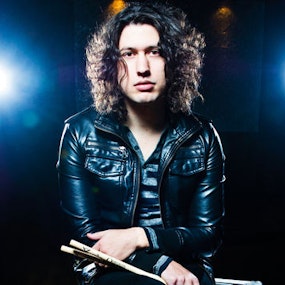
Ilan Rubin
Musician,
Ilan Rubin (born July 7, 1988) is an American musician, singer, and songwriter. He is known primarily for playing drums with bands such as Nine Inch Nails, Paramore, Lostprophets and Angels & Airwaves. He also has his own solo project called The New Regime, in which he sings, plays all instruments in the studio and plays guitar in live performances.
Featured Episodes
Here are some great episodes to get started with


















